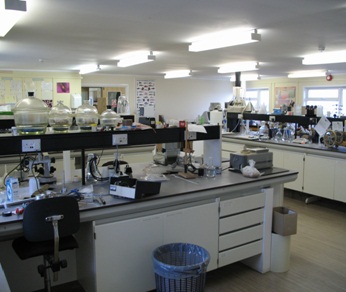Laboratory Services

The Department of Agriculture has a large and well equipped laboratory. It is the responsiblity of the laboratory for the processing of all soil and animal feed samples, along with faecial egg counting (FEC).
Soil samples are analysed for a wide range of nutrients including NPK (nitrogen, phosphorous and potassium), pH, and other physical and chemical properties.
The laboratory assists with the preparation of fish/squid samples for bacteriology tests. These samples are carried out by the public health laboratory at the Stanley hospital.
Sample of Meat and Fish are also processed by the laboratory before being sent to the UK for required testing such that they may be sold in to the UK and EU meat markets.
The laboratory also provides support to the Veterinary Services section with animal disease diagnosis and runs tests such as haematology profiles on blood samples, preparation of blood for biochemistry screening at the hospital and parasitological testing of faeces samples.
Soil and Plant testing
In the DoA Laboratory we can provide analytical testing on soil samples to provide information on the chemical properties of the soil.
As a basic package we offer pH and NPK testing:
pH: pH is determined by the use of a pH probe, we test for the pH in soil-water mix, a soil-CaCl2 mix and a soil-KCl mix, this allows us to make estimates on other properties of the soil. The pH is a measure of the H+ ions in the soil or its Acidity/Alkalinity. It varies on a scale from 1-14, and typically most plants like to grow in a soil with a pH around 6.5
Nitrogen (NO3-N): is determined by the Griess test, in which the Nitrate is reduced to Nitrite, then all Nitrite is reacted with several reagents to create an Azo-Dye which can be detected through Photospectrometry. Nitrate and Nitrite are the parts of the Nitrogen cycle which are most active and Nitrate is the end stage product used by plants, it is vitally important for the production of DNA and Proteins.
Phosphorus (P): is determined using the Bray I method this enables us to determine both extractable Phosphorus. P is a measure of the Phosphorus that is available in the soil for the plants to use, or exchangeable P, P is important to plants as it is essential for cell division and the development of the growing tip of the plant
Potassium (K): is determined using flame photometry allowing us to determine the extractable K in a sample. K is a measure of the Potassium available to plants in the soil, or exchangeable K, Potassium helps to stimulate plant growth particularly in early life, and is important for Water absorbency throughout a plant’s life time.
The Laboratory also offer tests for Sodium, Organic matter and Basic Cation Exchange capacity.
Feed Testing
Feed testing is only required if you are growing your own feed for livestock such as turnips, or potatoes.
The DoA laboratory can offer Feed tests for:
Metabolic energy, which is determined as a function of the Digestibility of Organic Dry Matter. The Metabolic Energy is an estimate of the energy that is available for use by the animal.
Dry matter, this is a measure of how much of the feed is not water, and is determined by the removal of all water from the sample.
Dry Matter Digestibility, this provides us with a prediction of the amount of the feed that may be digested by a ruminant, we achieve this through the Pepsin-Cellulose method which seeks to imitate the digestive track of Ruminants.
Crude Protein, this is determined through the Kjeldahl method. Crude Protein is a measure of the total Nitrogen in the plant which is the building block of all amino acids which make up all proteins.
Neutral Detergent Fibre, which is determined through the digestion of feed material in a neutral solution. Neutral detergent fibre is a measure of most fibre in a plant.
Phosphorous, which is a key building block of DNA and ATP both of which are vital for life to grow and exist, it is determined through the same method as used in Soil Testing.
FEC (Faecal egg count)
 The testing of animal faeces for the presence and quantity of parasite eggs is a helpful tool to determine if there is a need for worming treatment. The Veterinary Service and DoA are able to help do this by carrying out Faecal Egg Counts (FEC) on suitable samples from Sheep, Cattle, and Horses.
The testing of animal faeces for the presence and quantity of parasite eggs is a helpful tool to determine if there is a need for worming treatment. The Veterinary Service and DoA are able to help do this by carrying out Faecal Egg Counts (FEC) on suitable samples from Sheep, Cattle, and Horses.
FEC’s should be booked in with the Lab by contacting the Lab Scientist by email or phone.
Samples should be dropped off at the DoA no later than 48 hours after collection and should be stored in the fridge except when in transit, a sample submission form should be dropped off at this point too, these are available for download from our website. Samples should only be submitted on a Monday, Tuesday or Wednesday to allow for time to process them in that week.
Please ensure that samples are left with a staff member and not on the doorstep.
The DoA Laboratory Service now has a new online booking system that can be used to book FEC samples in to the Lab, it can be found on the DoA Lab Booking Website
Blood and Tissue Testing
The laboratory also performs haematological testing, and in vitro clinical chemical analysis if requested to do so by the veterinary services as well as hydatid checks on suspect samples from animals.
Other tests such as heavy metals, trace elements, and some blood and serum tests are sent overseas for testing in specialised laboratories.
Researchers
The DoA laboratory can provide space for scientific researchers to undertake laboratory research, and experimentation, as well as providing guidance and training on how to use the equipment available in the laboratory.
Researchers are required to complete a laboratory access form and review and add to a risk assessment both of which can be requested form the Laboratory Scientist. More guidance can be found in the Guidance for Visiting User’s document available for download below.
The DoA Laboratory Service now has a new online booking system that can be used to book space in the DoA Laboratory, it can be found on the DoA Lab Booking Website and reserchers must book there space through the Site to ensure that the space is avlible to them.
FEC (fecal egg count):
Soil Samples:
Feed Samples:
Researchers Information:
Joshua Anderson-Wheatley | Laboratory Scientist
Department of Agriculture | Falkland Islands Government | Stanley | Falkland Islands | FIQQ 1ZZ
Tel: +500 27355 | Fax: +500 27352 | E-mail: This email address is being protected from spambots. You need JavaScript enabled to view it. | Facebook: Falkland-Islands-Government-Department-of-Agriculture
Follow @FalklandsGov on Twitter | Like the ‘Falkland Islands Government’ Facebook page | Follow @Falklands_Gov on Instagram | Subscribe to our YouTube Channel

